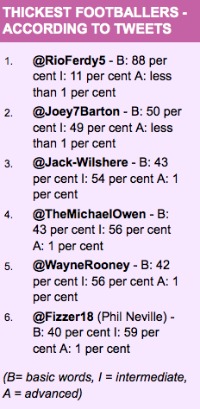A headline caught my eye today. It was “Twitter Twits: Rio Ferdinand is dubbed the dunce of Premier League Tweeters.” I immediately thought that any study that ranks people based on how dumb they are on Twitter has got to be a winner – I really wish they could rank my friends.
The article says that clickliverpool.com, an independent news site, used the Google search engine tool that “divides language used on web addresses into three categories of basic, intermediate and advanced” to look at the Twitter pages of the “most followed Premier League players.”
What they found was that Rio Ferdinand’s tweets consisted of 88% basic language and only 11% intermediate language – the worst of the worst. By comparison, Wayne Rooney’s tweets were a whopping 56% intermediate.
It didn’t take me long to figure out how clickliverpool performed their unscientific study. One of the advanced search options in Google involves the ability to “annotate results with reading levels.” Then you can search within a site or domain to find the range of results in each category – basic, intermediate and advanced. Google calls it the reading level tool.
So all you have to do is search the Twitter page of whoever you are studying with annotated language results turned on and you’ll get a reading of how advanced their language is across their tweets. For example, the tweets of footballer Jack Wilshere, who was included in the study, look like this when you perform the search “site:http://twitter.com/#!/jack_wilshere.”

But here’s where we find some discrepancy. According to the study, Jack Wilshere had a 43% Basic level and a 54% Intermediate level. What gives?
If you search ‘http://twitter.com/#!/jack_wilshire” without the specific denotation of a “site:” search, you will get these results:

They key is the parameters. Without the “site:” search, Google is actually calculating the reading levels for millions of results – basically anything on the web that mentions Jack Wilshere, Twitter, or anything in between. When you add that “site:” search, it simply pulls results from Twitter statuses created by the Jack Wilshere account. 9 million plus results vs. 819. And 819 is what we want.

So this list looks to be inaccurate, except for the top (worst) performer, Rio Ferdinand. His results match the “site:” search. It is likely that when clickliverpool used the Google tool to find its other results, they may have forgotten to search the specific Twitter page and instead searched millions of internet mentions – basically calculating the reading level of articles about the footballers instead of tweets made by them.
But the whole point of pointing this out is to say that this is quite a fun thing to do. By using the Google reading level search tool, you can look at the complexity of language in your friends’ tweets or those of celebrities. It is important to note, however, that these results will include some of your retweets, which aren’t necessarily your own words. But if you use this tool to check out someone who posts original tweets on a regular basis, it should give you a hint at the complexity of their language use on the social media site.
So, I conducted my own little unscientific study of the top 10 users on Twitter, based on number of followers. I wanted to see who was the most eloquent of the bunch. What I found surprised me, as I expect it will surprise you. Here is the top 10 list, organized by number of followers:
- Lady Gaga
- Justin Bieber
- Barack Obama
- Britney Spears
- Kim Kardashian
- Katy Perry
- Ashton Kutcher
- Ellen DeGeneres
- Taylor Swift
- Shakira
And here is how they ranked when it comes to language complexity, based on the biggest percentage of Intermediate results:
- Britney Spears (67%)
- Katy Perry (66%)
- Ashton Kutcher (49%)
- Barack Obama (23%)
- Lady Gaga (13%)
- Kim Kardashian (6%)
- Taylor Swift (5%)
- Justin Bieber (4%)
- Shakira (3%)
- Ellen DeGeneres (<1%)
Surprised?
The next question of course is what classifies something as intermediate text as opposed to basic text? It’s hard to say. Telling the difference between the intermediate tweets and the basic tweets is incredibly difficult.
The only person in the ten to score a tweet on the “Advanced” spectrum of the reading scale was Katy Perry. She received that distinction for this tweet:
1 melatonin, normal… 2 melatonin = CRAY CRAY dreams of petting tiny albino baby turtles and talking to a tree stump. help.
Is it the melatonin reference? Two of them? Albino? Something about this tweet has Google labeling it advanced.
Of course, this language search tool isn’t perfect. But it’s pretty fun.









 WebProNews is an iEntry Publication
WebProNews is an iEntry Publication